Uplifting Survivor Voices: “Legislating Hope: How One Woman Turned Pain into Policy to Protect Others,” Written by Witlee Ethan
Written by Witlee Ethan
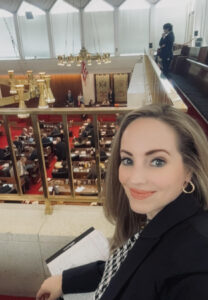
TW: Suicidal Ideation, Sexual violence, violence
From the time I was a young girl, I’ve always had an empathetic heart towards victims of injustice. Wanting to do something to make a difference and help them in some way. Which became my life’s mission when I became a crime victim of physical and sexual assault, having also experienced different kinds of abuse throughout my life. Going from Victim to Survivor to becoming a Victim Advocate is no small feat and has been an arduous journey. Yet, I am the resilient advocate I am today because of everything I’ve experienced. The violent acts I endured on Jan 6, 2020, when I was held hostage (false imprisonment), physically assaulted, and repeatedly sexually assaulted, is what led me to write legislation, to protect others from the injustices I experienced. What I know now that I didn’t know then is that all the trauma, heartache, loss, grief, and pain I would go through would lead me to a purpose I never could have imagined.
In Jan 2020, when I went on a date with a guy from a dating site. I had no idea that date would completely turn my world upside down in the worst ways nor did I realize years later it would also impact legislative change. But there would be a lot I would have to walk through, survive, and overcome before I would accomplish what I have now. Because of the assault I’ve experienced mental health struggles leading to suicide ideation, I became pregnant from the assault and endured a traumatic miscarriage, and I’ve been cruelly mistreated by others because of being sexually assaulted. Plus, the stress from the trauma in the aftermath of the assault, has taken a toll on my physical health. Sexual assault impacts victims in every way.
Yet, if that wasn’t bad enough, on top of everything I’ve also been revictimized and further harmed by our judicial system, the police, the DA’s office, Atrium healthcare system, multi-million-dollar corporations, state licensing boards, attorneys, and by a private investigative firm. In the last five years, my perpetrator has yet to be brought to justice by either the Cornelius Police Dept or the DA’s office. The police haven’t done their job to properly investigate my case and because of their negligence, my case escalated to a “She Said, He Sued” case. Which allowed my perpetrator to legally sue me for defamation all because I turned him in for his crimes. Sadly, perpetrators have more rights than victims and survivors do. This retaliatory tactic used by abusers to weaponize the system against their victim in an attempt to silence them is known worldwide as “She Said He Sued”.
When I was sued by my rapist, I was forced to file bankruptcy to protect myself. My case ended up in Civil Court, Bankruptcy Court, and Federal District Court. In Civil Court cases the victims are listed as the defendant while the perpetrators have a powerful advantage over their vulnerable victims because of money and connections. Victims are not given a pro bono attorney nor are victim services or resources made available to them because the lawsuit is a civil case, not a criminal case. My perpetrator filed his lawsuit against me because the companies he worked for used me as a scapegoat, prioritizing profit over protecting people. I had turned in my perpetrator to his company North American Senior Benefits (NASB) which was acquired by Integrity Marketing Group, because he was conducting business while assaulting me. He got on a companywide call and muted it while he committed crimes. The companies first protected him but when they eventually fired him, they blamed me shifting the blame to the victim. What they did resulted in him filing his lawsuit against me. The unethical actions of these two companies caused me financial devastation. I didn’t just have to file bankruptcy, I also ended up in debt.
With my court case I had to advocate for myself including writing motions, filing motions, and representing myself pro se. I was in a very vulnerable position desperately needing help in my case and had reached out to over 100 attorneys. Unfortunately, the attorneys that were willing to represent me or give me legal advice caused more harm instead of helping. These attorneys jeopardized my case and didn’t follow the ethical standards of the state bar. One male attorney sexually harassed me and made sexually inappropriate comments about my case. This court case exposed a lot of injustices within our system. Including the Cornelius Police protecting my perpetrator by refusing to even bring him in for questioning and working with him instead of working to bring him to justice. During the settlement agreement negotiations that I was forced by the Court to attend with my perpetrator, he put stipulations in the agreement that protected the police. The mediator during mediation threatened that if I didn’t sign the settlement agreement that my perpetrator would go after my family. Which was a valid concern considering my perpetrator has AR15’s as well as other guns in his possession that the police refuse to investigate. Plus, he had hired Derecho Investigations and Security Consultants operated by former military and police personnel, to find me for him. Which they gave my perpetrator addresses for me and my family, endangering our safety. One of my biggest safety concerns regarding my perpetrator is that he is an insurance producer who is licensed across the nation and goes into his clients’ homes without them being aware of the crimes he’s committed. The state licensing boards won’t do anything to remove his licenses unless the police charge him, but the police refuse to hold him accountable in any way. So, for the last five years he’s been walking free and able to rape again.
Against all odds I won my case against him while representing myself pro se in Feb 2023. In the final case decision, the Judge stated that my perpetrator is a liar and made the settlement agreement moot. Which meant I was no longer silenced, and he was no longer protected. After this win he gave up his final 2 appeals, the case was over. This was a huge victory in so many ways. Every case sets a precedent, in my case the victim won over her abuser. But two months after this win in April 2023, Chief Baucom of the Cornelius Police Dept, closed my case letting me know that they did not consider all the evidence and some evidence would not be reviewed at all. I was also told that they would only re-open my case if another woman is raped. That was the moment that changed everything. In response to the police failing to protect people from rapists, and after our system has continued to fail me and other victims and survivors. On April 25, 2023, I wrote my bill.
Though I had never written a bill before, it was the first step towards creating change that I saw was needed from all the injustices that took place in the handling of my case. Change that would give victims and survivors justice, hold perpetrators accountable, and work towards preventing what happened to me from happening to anyone else. At this point I had already been in touch with the NCCASA and staff attorney Skye David regarding my story. On April 15, 2024, my bill was drafted in the House and over the next year me, Skye, and many Legislators would tirelessly lobby for this bill. On April 3, 2025, my bill on Sexual Assault Victim Rights part of HB 771: Criminal Law Procedures https://webservices.ncleg.gov/ViewBillDocument/2025/3703/0/DRH10350-SA-8) was introduced for the first time in the NCGA House of Representatives. I was able to speak on my bill before the J2 Committee on April 15, 2025, and after I spoke, I got to witness it passing unanimously and moving to Rules, which it passed on April 28, 2025. I was also there in the gallery on April 29, 2025, when it passed the House. After it passed with 111 votes to 3, the House Speaker announced, “ I have one more courtesy of the gallery that is part of the bill that the body just passed upon motion of Rep. Stevens, the Chair is happy to extend the courtesy of the gallery to Witlee Ethan who was an inspiration for portions of HB 771. At that point, Members of the House and those in the gallery proceeded to give me a standing ovation recognizing me for my advocacy and my contribution to the bill. It was a powerful moment for me as a woman, as a victim, a survivor, and victim advocate for others. Because as I said during my speech before the J2 Committee, “I was standing there representing every victim, every survivor, every woman, and standing up advocating for every child.” Exactly 2 years after I wrote my bill it passed the House and it happened during Sexual Assault Awareness Month. A moment in time I’ll never forget especially when victims and survivors are often silenced, dismissed, and disregarded, but in this moment before the NC House of Representatives we were seen and acknowledged. This fight for justice started out to hold my perpetrator accountable, but it became a mission to protect everyone. This bill has made crossover and is now in the Senate. The progress this bill has made is nothing short of a miracle and it truly is a monumental milestone.
I hope my story gives you hope and encourages you. No matter what you’ve endured, something good can still come from it. There is purpose in the pain. If I hadn't gone through what I went through, I never would have written this bill. Which can directly impact over 11 million people with the ability to help even more people. To the victims and survivors, you are not alone.
For more info on Witlee Ethan, please visit https://linktr.ee/LiveEachDayWithPurpose
Stalking is a serious, yet often misunderstood, form of abuse that affects millions of people each year. This January, NCCASA invites you to learn more about the dynamics of stalking, its devastating impacts, and how we can collectively work to support survivors and prevent this pervasive issue.
Understanding Stalking
Stalking is defined as a pattern of behavior directed at a specific person that would cause a reasonable person to feel fear. These behaviors can include repeated, unwanted contact such as phone calls, text messages, or emails, as well as actions like following, monitoring, or tracking someone without their consent. With the rise of technology, perpetrators increasingly use tools like GPS tracking, social media monitoring, and spyware to intimidate and control victims.
The statistics are telling:
- 1 in 3 women and 1 in 6 men have experienced stalking in their lifetime, and an estimated 13.5 million individuals are affected each year in the United States.
- Transgender and nonbinary folks report experiencing stalking at a higher rate compared to cisgender folks.
- Stalking is most often perpetrated by someone the victim knows—3 out of 4 victims are stalked by someone they are familiar with, such as a current or former partner.
- Young adults aged 18-24 experience the highest rates of stalking, with more than half of reported cases occurring before the age of 25 and close to a quarter occurring before the age of 18.
Stalking is not just invasive—it can escalate into physical violence and other forms of abuse, making early intervention crucial for violence prevention.
The Impact of Stalking
The emotional and psychological toll of stalking is profound. Victims often report anxiety, depression, and a constant sense of fear. The disruptions to daily life, such as changing jobs, relocating, or altering routines to avoid the stalker, can be overwhelming. Stalking also impacts survivors financially, with costs for increased security, legal fees, and missed work.
More specifically,
- 46% of stalking victims fear not knowing what will happen next.
- 29% of stalking victims fear it will never stop.
- 1 in 8 employed stalking victims lose time from work as a result of their victimization and more than half lose 5 days of work or more.
- 1 in 7 stalking victims move as a result of their victimization.
How to Respond
Understanding how to respond to stalking is vital in supporting survivors and preventing harm:
- Recognize the signs: Take threats and behaviors seriously, even if they initially seem minor. Stalking is often dismissed or minimized, but early recognition is key.
- Document everything: Encourage survivors to keep records of stalking behaviors, including screenshots, voicemails, and detailed notes of incidents.
- Develop a safety plan: Connect survivors with local advocacy organizations to create a personalized safety plan.
- Know the law: Stalking is a crime in all 50 states, but legal definitions and protections vary. Familiarize yourself with state-specific resources to provide the best support. Here is North Carolina’s statute on stalking.
Resources for Survivors and Advocates
There are many resources available for those experiencing stalking and for advocates working to address it:
- For Advocates→ SPARC: SPARC is a federally funded project providing education and resources about the crime of stalking. SPARC is funded by the Department of Justice, Office on Violence Against Women (OVW) and they provide training and technical assistance to the U.S. Department of Justice Office on Violence Against Women (OVW) grantees and potential grantees. Visit https://www.stalkingawareness.org/
- For Survivors→ Victim Connect Resource Center: Victim Connect Resource Center (VCRC) is a weekday phone, chat, and text-based referral helpline operated by the National Center for Victims of Crime. Services are available for all victims of crime in the United States and its territories. Visitors to the hotline receive strength-based and trauma-informed services and referrals in over 200 languages. Call 1-855-4-VICTIM or visit victimconnect.org.
-
- RAINN National Sexual Assault Hotline: RAINN is the nation’s largest anti-sexual violence organization. RAINN operates the National Sexual Assault Hotline, which can be reached at 800-656-HOPE (4673). For more of RAINN’s resources, including online chat hotlines, visit here.
-
This year, we’ve made incredible strides in the fight to end sexual violence—and with your support, we can do even more.
2024 marks another remarkable year of policy advancements, bringing positive, lasting change to the lives of survivors across NC. In recent years, we have seen a rise in technology-facilitated sexual violence, including the use of ‘deepfakes.’ This involves using AI to superimpose another person’s face onto explicit images without their consent, often with the intent to harm their reputation. Before House Bill 591, individuals could distribute such images without facing adequate legal consequences. This harmful trend, particularly prevalent among youth in North Carolina, prompted NCCASA to take swift action. We worked tirelessly with lawmakers to pass critical legislation, giving survivors more options for both criminal justice and civil remedies. These policy changes continue to empower survivors to reclaim their autonomy, reputation, and privacy.
In addition to creating lasting policy change, NCCASA has received valuable feedback directly from survivors on the impact of our advocacy and legal services:
“‘Thank you’ cannot do justice for the support and guidance you have given me over the past few months. I’m forever grateful that you took on faith and courage to believe me and represent me when it felt like nobody else would.”
Without the monetary support of our community, our capacity to represent survivors, advocate for survivor protections, and educate to prevent sexual violence would not be possible. As we look forward to the future, we are committed to continue meeting the needs of survivors, making sure they feel safe, heard and seen in their healing journey.
Will you join our commitment to create even greater impact in 2025? We have a goal of raising $10,000 in unrestricted dollars this year to continue to provide legal services and policy change. Every dollar you give helps build a future where survivors are empowered and safe spaces are the norm, not the exception.
- You can scan the QR code below to donate instantly online.
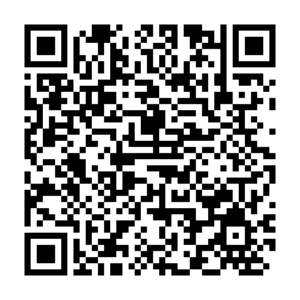
- Have questions or want to make a donation with a staff member’s help? Call us at (919) 871-1015.
Please note that you can choose to make your gift recurring, ensuring sustainable support for our mission year-round.
With your partnership, we can continue to stand with survivors and work toward ending sexual violence for all people. It is up to us to continue to create and sustain safer, healthier, and more equitable communities–the ones we deserve and can thrive in collectively and joyfully.
Thank you for being an essential member of our community.
In Solidarity,
NC Coalition Against Sexual Assault (NCCASA) Team

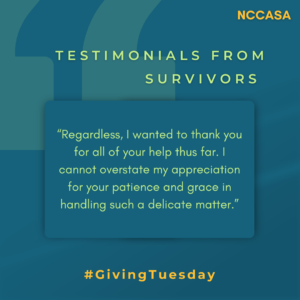
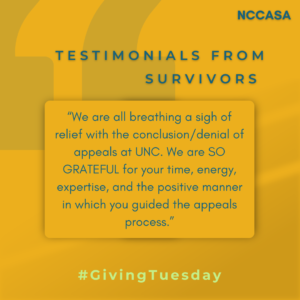
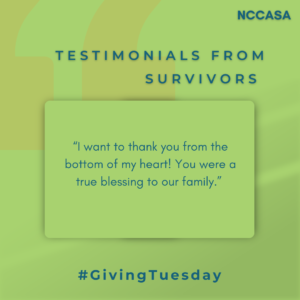
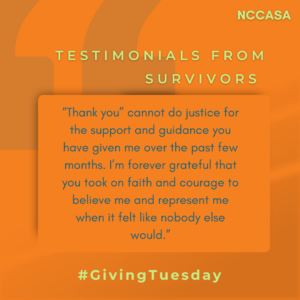
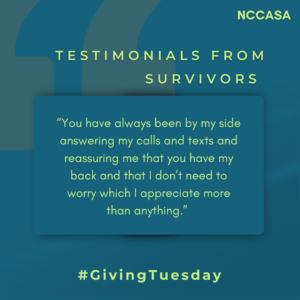
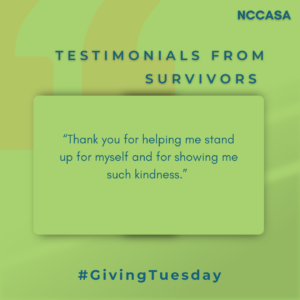
NCCASA now provides a new service that helps survivors with one of the steps to repair their credit. As part of the Debt Bondage Repair Act, survivors can remove adverse information from their credit report that is related to events that took place during and after their human trafficking experience. Poor credit bars survivors from things like housing, employment, or car purchases.
Survivors of human trafficking can have specific information blocked from their credit reports. Some examples provided by Polaris Project include: “prior evictions, late rental payments, credit card or loan defaults, unpaid bills that went to a collection agency, criminal convictions that were the result of a trafficking experience, and bankruptcy filings.”
Survivors must provide the following information for eligibility:
1. Proof of identity
2. Victim Determination Documentation
3. A list of what needs to be blocked that was a result of a survivor’s trafficking experience
NCCASA is an NGO authorized by the NC Department of Justice that can provide a Victim Determination Document (VDD): a signed document stating/attesting a person is a victim of human trafficking, as it is defined by the Trafficking Victims Protection Act of 2000:
● Sex trafficking is the recruitment, harboring, transportation, provision, obtaining,patronizing, or soliciting of a person for the purposes of a commercial sex act, in which the commercial sex act is induced by force, fraud, or coercion, or in which the personinduced to perform such an act has not attained 18 years of age (22 USC § 7102).
● Labor trafficking is the recruitment, harboring, transportation, provision, or obtaining of a person for labor or services, through the use of force, fraud, or coercion for the purposes of subjection to involuntary servitude, peonage, debt bondage, or slavery, (22 USC §7102).
To request information about obtaining from NCCASA a signed Victim Determination Document for credit repair as specified under the Debt Bondage Relief Act, please email [email protected] or call 919-871-1015.

